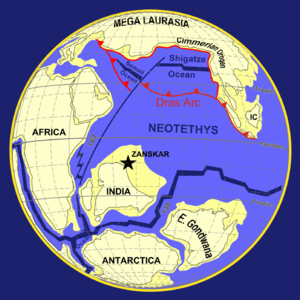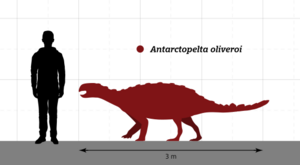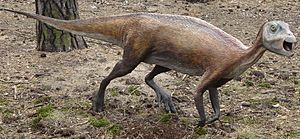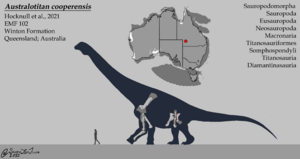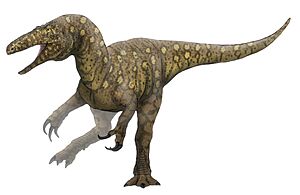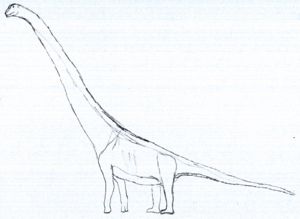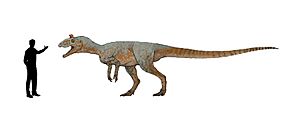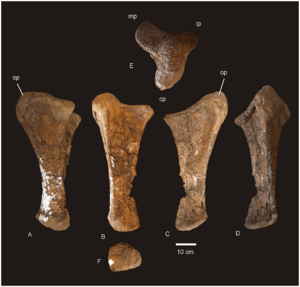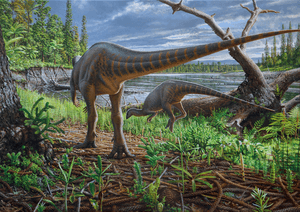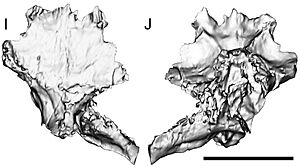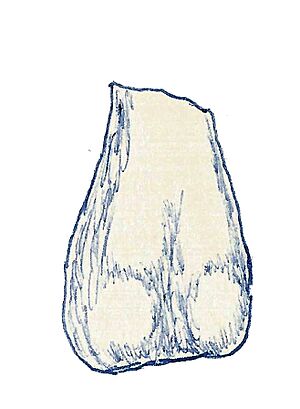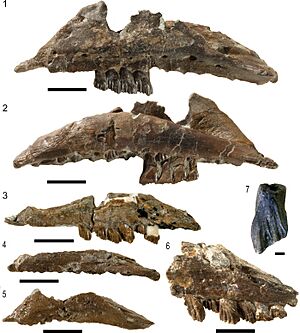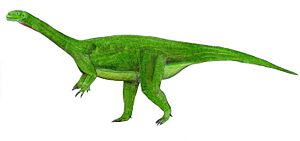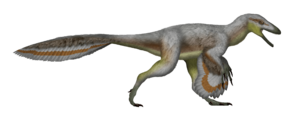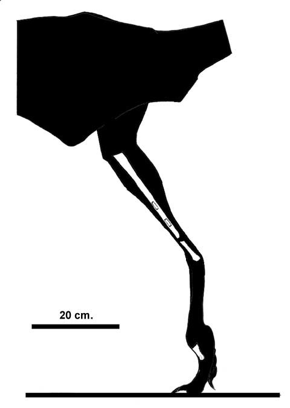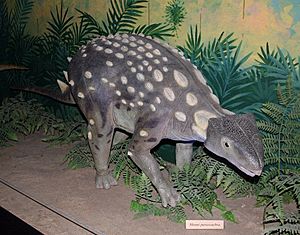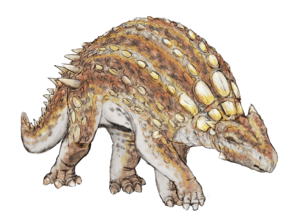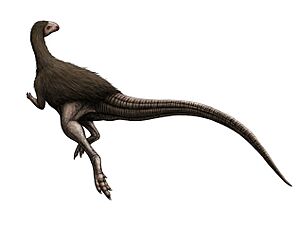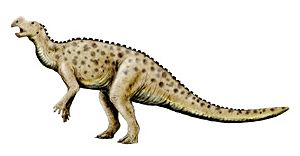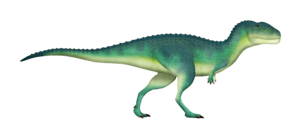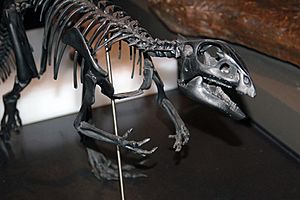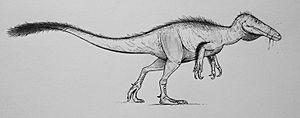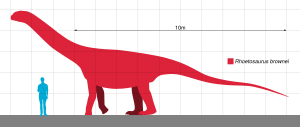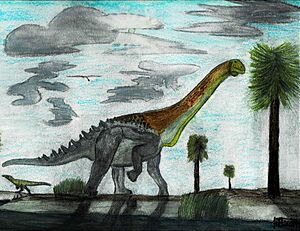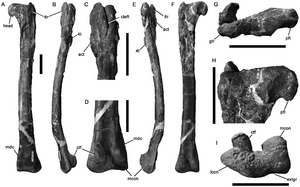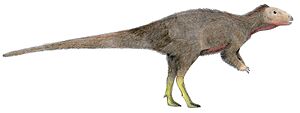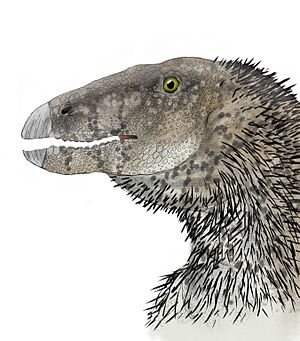List of Australian and Antarctic dinosaurs facts for kids
This article is a list of amazing dinosaurs whose bones and other remains have been found in Australia or Antarctica. These two continents might seem far apart today, but millions of years ago, they were connected! This meant dinosaurs could roam between them.
Contents
- Dinosaurs of Australia and Antarctica
- What Makes a Dinosaur Count?
- Meet the Dinosaurs!
- Antarctopelta
- Atlascopcosaurus
- Australotitan
- Australovenator
- Austrosaurus
- Cryolophosaurus
- Diamantinasaurus
- Diluvicursor
- Fostoria
- Fulgurotherium
- Galleonosaurus
- Glacialisaurus
- Imperobator
- Kakuru
- Kunbarrasaurus
- Leaellynasaura
- Minmi
- Morrosaurus
- Muttaburrasaurus
- Ozraptor
- Qantassaurus
- Rapator
- Rhoetosaurus
- Savannasaurus
- Serendipaceratops
- Timimus
- Trinisaura
- Weewarrasaurus
- Wintonotitan
- Mystery Dinosaurs
- Timeline
- See also
Dinosaurs of Australia and Antarctica
What Makes a Dinosaur Count?
For a dinosaur to be on this list, its genus (a group of closely related species) must be officially recognized. Also, at least one species of that dinosaur must have been discovered in either Australia or Antarctica.
Meet the Dinosaurs!
Antarctopelta
Antarctopelta was an armored dinosaur found in Antarctica in 2006. It lived during the Late Cretaceous period. Scientists found some unusual tail bones that might have supported a weapon like a "macuahuitl," which was a type of ancient sword.
Atlascopcosaurus
Discovered in 1989, Atlascopcosaurus lived in Australia during the Early Cretaceous. We only know about this dinosaur from its jaw and teeth. It was a plant-eating dinosaur.
Australotitan
Australotitan was found in Australia in 2021. It's the biggest dinosaur ever found in Australia! This giant plant-eater lived during the Late Cretaceous and was as huge as some of the massive dinosaurs found in South America.
Australovenator
Found in Australia in 2009, Australovenator was a speedy meat-eating dinosaur from the Late Cretaceous. Studies of its arms show it was very good at grabbing things, perhaps its prey!
Austrosaurus
Austrosaurus was discovered in Australia in 1933. This long-necked plant-eater lived during the Early Cretaceous. Its first fossil was found near ancient seashells, suggesting it lived close to the sea.
Cryolophosaurus
Cryolophosaurus was found in Antarctica in 1994. This meat-eating dinosaur from the Early Jurassic had a very unique crest on its head. It looked like a "pompadour" hairstyle, going from side to side!
Diamantinasaurus
Discovered in Australia in 2009, Diamantinasaurus was a large plant-eating dinosaur from the Late Cretaceous. Scientists think it might be related to titanosaurs from South America. This suggests dinosaurs could travel between continents through Antarctica.
Diluvicursor
Diluvicursor was found in Australia in 2018. This small, fast-moving dinosaur lived during the Early Cretaceous. It lived in an ancient floodplain, very close to a powerful river.
Fostoria
Fostoria was discovered in Australia in 2019. This plant-eating dinosaur from the Late Cretaceous is special because four individuals were found together. This gives clues about how they lived.
Fulgurotherium
Fulgurotherium was found in Australia in 1932. Only small pieces of this dinosaur have been found. It lived during the Late Cretaceous and might have been a type of dinosaur called an elasmarian.
Galleonosaurus
Discovered in Australia in 2019, Galleonosaurus was an Early Cretaceous plant-eater. Its upper jaw bone looks like an old sailing ship (a galleon) when you turn it upside down!
Glacialisaurus
Glacialisaurus was found in Antarctica in 2007. This early long-necked dinosaur lived during the Early Jurassic. It was a basic type of sauropod but survived long enough to live alongside more advanced ones.
Imperobator
Imperobator was discovered in Antarctica in 2019. This meat-eating dinosaur from the Late Cretaceous was unusual. Unlike many of its relatives, it didn't have a large, sickle-shaped claw on its foot.
Kakuru
Kakuru was found in Australia in 1980. This Early Cretaceous dinosaur is not very well known because only a few fossils have been found.
Kunbarrasaurus
Kunbarrasaurus was discovered in Australia in 2015. This armored dinosaur lived from the Early to Late Cretaceous. Scientists found its stomach contents, which included ferns, fruits, and seeds!
Leaellynasaura
Leaellynasaura was found in Australia in 1989. This small plant-eater lived during the Early Cretaceous. One fossil suggests it had an extremely long tail, possibly three times longer than the rest of its body!
Minmi
Minmi was discovered in Australia in 1980. This armored dinosaur from the Early Cretaceous had surprisingly long legs for its kind. Perhaps this helped it run into bushes for protection.
Morrosaurus
Morrosaurus was found in Antarctica in 2016. This plant-eating dinosaur from the Late Cretaceous was closely related to other dinosaurs found in Australia and South America.
Muttaburrasaurus
Muttaburrasaurus was discovered in Australia in 1981. This large plant-eating dinosaur lived from the Early to Late Cretaceous. It had a short, oval bump on its snout.
Ozraptor
Ozraptor was found in Australia in 1998. This meat-eating dinosaur from the Middle Jurassic is potentially the oldest known abelisauroid, a group of predatory dinosaurs.
Qantassaurus
Qantassaurus was discovered in Australia in 1999. This Early Cretaceous plant-eater was different from other similar dinosaurs of its time because it had a relatively short lower jaw bone.
Rapator
Rapator was found in Australia in 1932. This meat-eating dinosaur from the Early to Late Cretaceous is only known from a single hand bone.
Rhoetosaurus
Rhoetosaurus was discovered in Australia in 1926. This long-necked plant-eater from the Late Jurassic had four claws on its back feet, which is a very old trait for dinosaurs.
Savannasaurus
Savannasaurus was found in Australia in 2016. This huge plant-eating dinosaur from the Late Cretaceous might have spent more time near water than other sauropods.
Serendipaceratops
Serendipaceratops was discovered in Australia in 2003. This Early Cretaceous dinosaur had a strong arm bone, similar to horned dinosaurs or armored dinosaurs. It was likely an armored dinosaur.
Timimus
Timimus was found in Australia in 1993. This Early Cretaceous dinosaur might have been a tyrannosauroid, a group that includes T. rex. If so, it would be one of the few found in the southern continents.
Trinisaura
Trinisaura was discovered in Antarctica in 2013. This plant-eating dinosaur from the Late Cretaceous was the first ornithopod (a group of bird-hipped dinosaurs) ever named from Antarctica.
Weewarrasaurus
Weewarrasaurus was found in Australia in 2018. This Late Cretaceous dinosaur is special because its fossils were preserved in beautiful opal!
Wintonotitan
Wintonotitan was discovered in Australia in 2009. This long-necked plant-eater lived from the Early to Late Cretaceous. It was more slender than other large titanosaurs living at the same time.
Mystery Dinosaurs
Sometimes, scientists find dinosaur remains that are hard to identify. These are some of the "mystery" dinosaurs from Australia and Antarctica:
- Agrosaurus macgillivrayi: This dinosaur was first thought to be from Australia. But it might actually be from Europe, possibly the same as Thecodontosaurus.
- "Allosaurus robustus": This was first described as a new type of Allosaurus. However, it might actually be a different kind of meat-eating dinosaur, like a megaraptoran or abelisauroid.
- "Biscoveosaurus": This was said to be a large plant-eating dinosaur that lived at the same time as Morrosaurus.
- Walgettosuchus woodwardi: Some think this dinosaur might be the same as Rapator. But we don't know enough about either to be sure.
Timeline
This timeline shows when some of the dinosaurs from this list lived. Time is measured in millions of years ago (Ma).
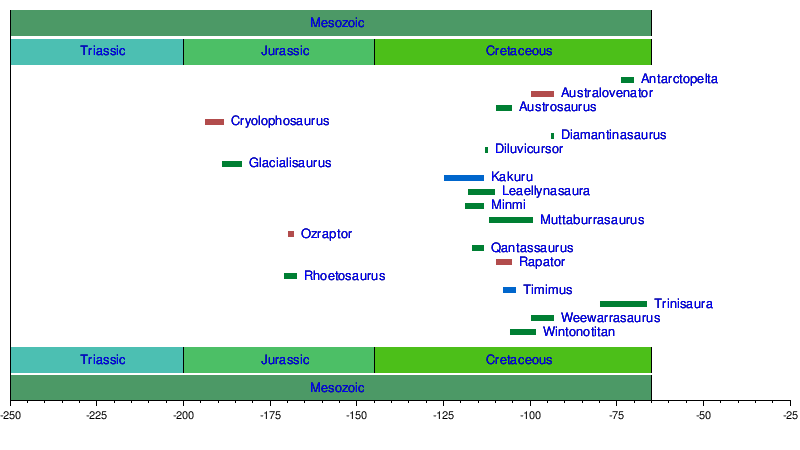
See also
- List of birds of Australia
- List of birds of Antarctica
 | Kyle Baker |
 | Joseph Yoakum |
 | Laura Wheeler Waring |
 | Henry Ossawa Tanner |


